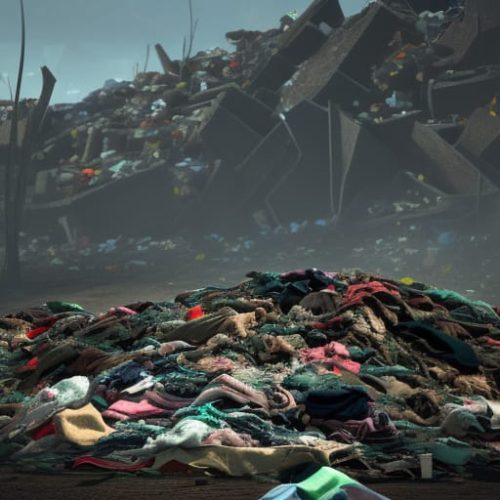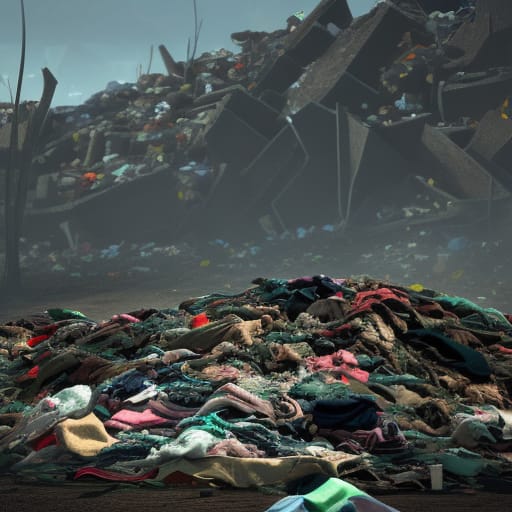Climate crisis is a huge threat to humanity. What’s less known about it is that the fashion industry is one of the biggest contributors, with fast fashion being the main culprit. The production of fast fashion garments requires large quantities of water, energy and chemicals and promotes the rapid consumption and of disposal of inexpensive clothing items, leading to excessive waste. Subsequently, the fashion industry’s carbon footprint is substantial, accounting for between 8 and 10 per cent of global greenhouse gas emissions.

In response to the impact fast fashion has on the environment, people are seeking alternatives. This has seen the concept of sustainable fashion gaining momentum, however, there is still scepticism as to whether sustainable fashion can solve these issues. The term Sustainable Fashion can be hugely overused by companies resulting in “greenwashing” and misleading customers, which many fast fashion brands have been found guilty of. However, the term refers to the use of eco-friendly materials and production processes and encourages a more circular business model that aims to achieve carbon neutrality. But it doesn’t stop there, the definition can be extended to second-hand shopping, upcycled and repurposed garments, as well as shopping for more durable and timeless pieces.
Many high street brands have released sustainable and eco-friendly lines, for example, there’s ZARA’s “Join Life” range and H&M’s “Conscious” collection. Taking it further, some brands such as ZARA and Pretty Little Thing have also created marketplaces to encourage a longer lifespan for clothes and second-hand shopping.
Vintage retail assistant, Sabrina Khan, is unsure if sustainable fashion is the answer to the environmental impact the fashion industry has, saying, “There are labour requirements that mean we must be paid a minimum wage but this isn’t the case in the developing countries where cheap clothing manufactured, so I do understand why sustainable fashion is more expensive. But to have a positive effect, the prices do need to be made more accessible.”
“I also think it’s about supply and demand. Social media is a hub of influencers, fashion, trends and micro trends, and I can’t see UK-based manufacturers being able to keep up with that.”
Fashion enthusiast Hannah Druce also tells us “I know there’s huge amounts of waste incurred with fast fashion, but sometimes, the concept of sustainable shopping does annoy me because I think it’s unrealistic.”
“In today’s economic climate, people can’t afford to spend £50.00, and sometimes more, on one item. I think people should follow Vanessa Friedman’s mindset when she spoke about sustainable fashion in one of her articles, calling for people to think more responsibly about their fashion choices and rather than telling people to shop sustainably, they should shop responsibly.”
Many organisations in Dorset are fighting for sustainability, including Sustainable Dorset. However, with Dorset being home to only 173 active charity shops and even fewer vintage and second-hand retailers, when compared to the number of fast fashion clothing stores, there are limited options to make more sustainable shopping decisions.
Speaking with Susan Chapman, Sustainable Champion for Boscombe, she has shared her concern for people’s tendency for wastefulness, saying that “it is such a huge curse and has an enormous impact [on the planet].”
“We can all help find the solutions if we are educated to salvage and survive as our planet’s resources are not infinite. We must be taught how to live more modestly as our species continues to multiply and gobble up these finite resources” she adds.
Lucy Jackson, Marketing Director at sustainable clothing brand Kite Clothing, also believes in the potential of sustainability in fashion saying, “One of the most environmentally impactful things any brand can do is make clothes that last, in turn reducing the need for new clothes to be purchased. It is always great to see sustainability on the agenda of big brands as they have the capacity to raise awareness in a way smaller, niche brands do not. However, there also is the risk of greenwashing for the sake of revenue which is not truly helpful in the drive for real change.”
“There is no silver bullet and right now times are very tough. There are also lots of small things we can all do, I personally feel strongly that the focus should be on ‘being’ more sustainable in our fashion choices, not just the shopping part. No one can do everything, but everyone can do something” She adds.
Currently, sustainable fashion as a concept is still in its infancy and it is unclear if it holds the answers to the problems caused by the fashion industry and fast fashion. However, education on the environmental impact fast fashion can have and how sustainable fashion choices positively impact this is vital to finding the solutions to the fashion industry and climate change.
This feature makes use of AI-generated content. Paragraphs 1 and 2 were written with the help of ChatGPT. Multiple prompts were used to generate the text, which was then manually fact-checked, verified, and edited by the author. The image on this feature has also been generated by Night Café.








